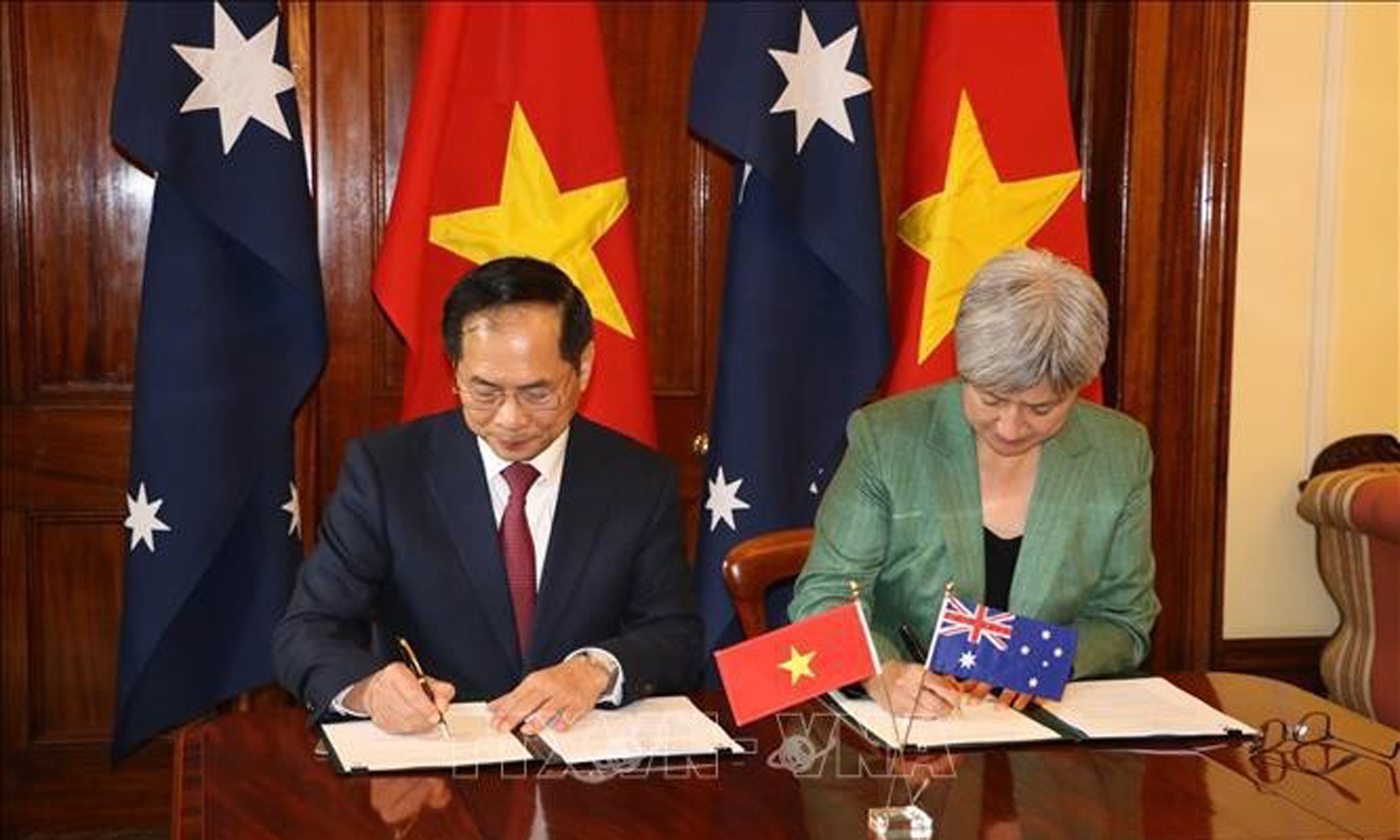Vietnam, Australia target 20 billion USD in bilateral trade
ABO/NDO- Vietnam and Australia agreed to enhance their trade and investment ties, striving to reach the target of 20 billion USD in bilateral trade at their 6th Foreign Ministers' Meeting in the Australian city of Adelaide on October 18.
Vietnamese Deputy Prime Minister and Minister of Foreign Affairs Bui Thanh Son, and Australian Minister for Foreign Affairs Penny Wong, who co-chaired the meeting, noted with pleasure the thriving bilateral relations across fields, both bilaterally and multilaterally.
They stressed progress in the bilateral political ties, exchange of all-level delegations, and defence cooperation, with the successful organisation of the first Ministerial Security Dialogue and effective collaboration in United Nations peacekeeping.
Both officials viewed the upgrade of the bilateral relationship to a Comprehensive strategic partnership on the occasion of Prime Minister Pham Minh Chinh’s official visit to Australia in May as a strong, historical development step in the bilateral ties, opening up a new cooperation period with higher political trust and more intensive, extensive, and practical cooperation.
 |
| Vietnamese Deputy Prime Minister and Minister of Foreign Affairs Bui Thanh Son (left) and Australian Minister for Foreign Affairs Penny Wong sign an action programme to implement the Comprehensive strategic partnership for 2024 – 2027. (Photo: VNA). |
They also consented to step up high-level visits in the time ahead, and double investment as outlined in the Enhanced Economic Engagement Strategy (EEES).
Son appreciated the two countries’ opening doors to each other’s fruits, and Australia’s acceleration of the implementation of its Southeast Asia Economic Strategy to 2040 in Vietnam.
The Vietnamese official suggested the two countries continue fostering connectivity through cooperation in education, people-to-people exchanges, and the implementation of visa programmes for Vietnamese to work in Australia.
Son used this occasion to thank the Australian Government and people for being the first to present essential supplies to Vietnamese localities, helping them recover from the impact of Typhoon Yagi.
Wong suggested Vietnam further facilitate Australian investment in the country, particularly in high-tech, saying the two nations should expand cooperation in such areas as climate change response, green growth, energy transition, digital transformation, and innovation, where Australia has potential and strengths.
Australia will continue its support to Vietnam in technological research and development, green technology, infrastructure development in service of energy transition, digital infrastructure, and human resources development through both official development assistance (ODA) and investment projects, she pledged.
Australia will also grant more scholarships to Vietnamese students and expand cooperation and connectivity between educational institutions of the two countries, the minister added.
Regarding cooperation between the two foreign ministries, they concurred to continue promote and effectively deploy the existing cooperation mechanisms and intensify strategic information exchange.
The two sides also agreed to enhance their cooperation and mutual support at multilateral forums, especially the United Nations and the Association of Southeast Asian Nations (ASEAN).
Wong said Australia attaches importance to its cooperation with ASEAN as well as the bloc's centrality, and commits to strengthening the collaboration for sustainable development in the Mekong Sub-region within the Mekong-Australia Partnership.
Regarding the East Sea issue, the two sides emphasised the importance of maintaining peace, stability, safety, and freedom of navigation and aviation, and respecting international law, including the 1982 United Nations Convention on the Law of the Sea (UNCLOS).
At the end of the meeting, the two officials signed an action programme to implement the Comprehensive strategic partnership for 2024 – 2027.
(Source: NDO)
 về đầu trang
về đầu trang







